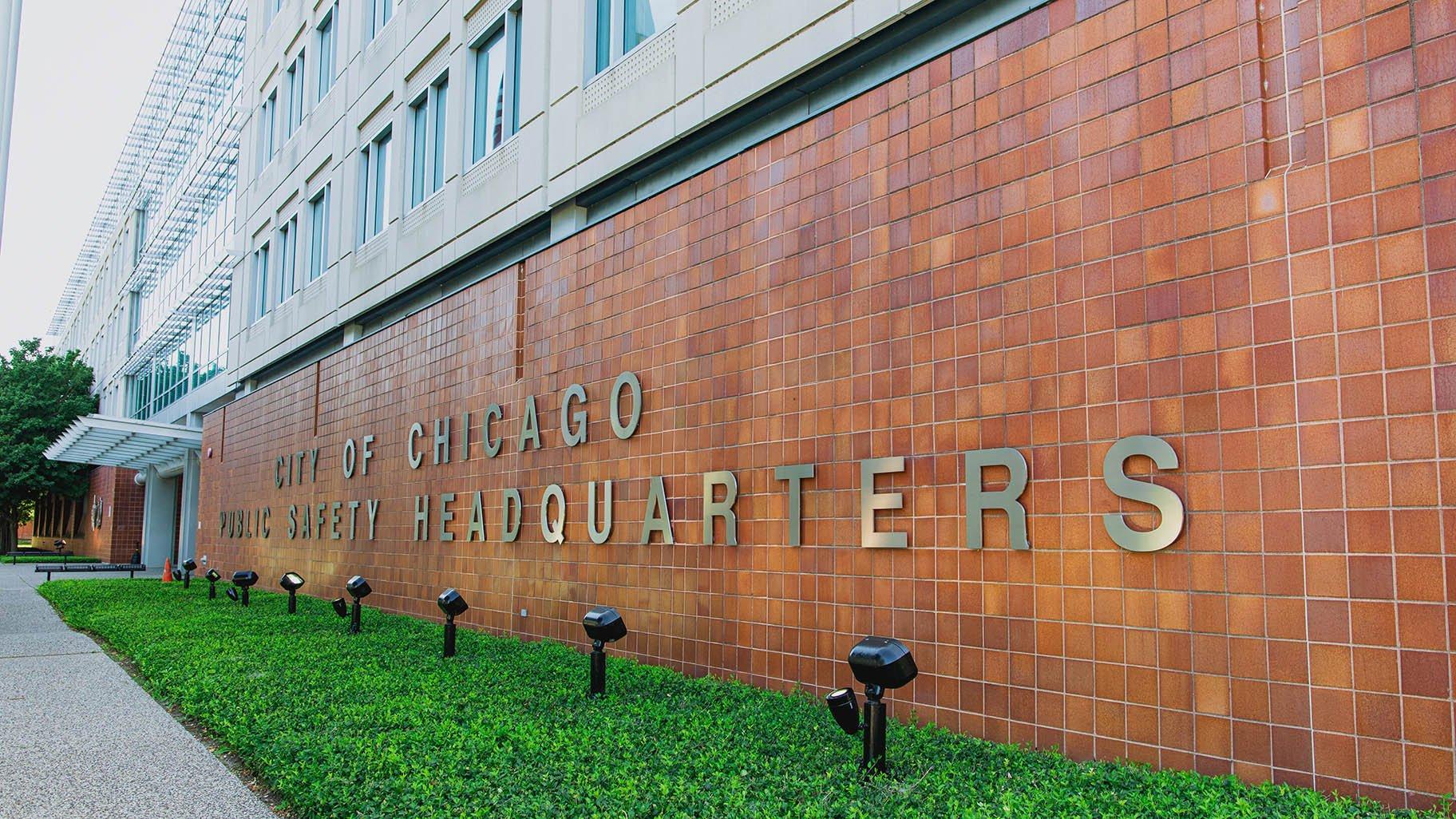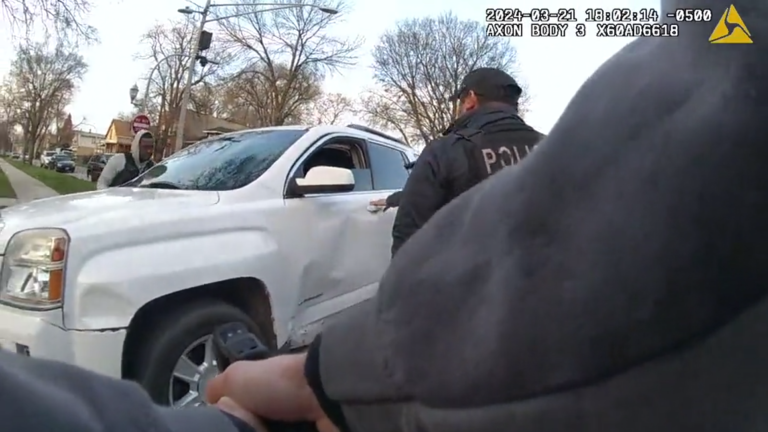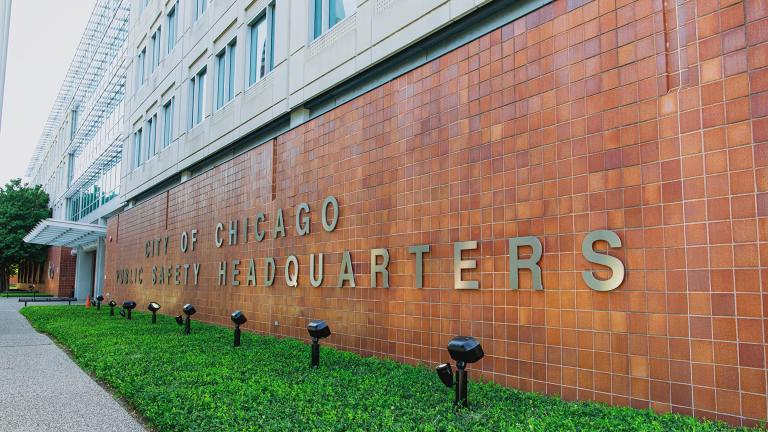 Chicago Police Department Headquarters, 3510 S. Michigan Ave. (Michael Izquierdo / WTTW News)
Chicago Police Department Headquarters, 3510 S. Michigan Ave. (Michael Izquierdo / WTTW News)
A key Chicago City Council panel voted 10-5 on Thursday to reject an effort backed by the city’s largest police union to upend the system used to punish officers for 60 years, even as the panel unanimously endorsed an agreement to extend the union’s contract for an additional two years in return for bigger than expected raises and bonuses for officers.
The decisions by the City Council’s Workforce Development Committee tee up a vote by the full City Council on Wednesday on the agreement brokered by Mayor Brandon Johnson to resolve the issues left over from the contract agreement reached by former Mayor Lori Lightfoot in July 2021 that ended the longest union negotiations in the city’s history.
If 30 members of the City Council vote to reject the changes to the police discipline system, a judge will likely decide whether Chicago Police officers facing a suspension of at least a year or termination have the right to have their cases decided by an arbitrator rather than by the Chicago Police Board.
As part of negotiations over the city’s labor agreement with the Fraternal Order of Police, Lodge 7, an arbitrator ruled that officers had the right to choose how their cases were resolved. It is unlikely that few, if any, officers would decide to give the police board the final say rather than an arbitrator, who must be appointed with the blessing of union leaders.
Jim Franczek, the city’s chief labor negotiator, acknowledged that it was unusual to ask the City Council to reject part of a labor agreement while approving the rest, but said it had happened before, in cases where negotiations were hopelessly deadlocked.
Johnson urged the City Council to reject that decision, saying that officers should not be allowed to have serious discipline cases resolved behind closed doors by a single individual rather than a public board made up of members confirmed by the Chicago City Council. That would be “a major setback for police accountability and reform,” the mayor has said.
The change is also opposed by Chicago Police Board President Ghian Foreman, who Thursday urged the committee to reject the decision by the arbitrator, calling it a step backward in transparency.
That brought a furious response from police union President John Catanzara who said the Police Board has long been unfair to officers, including Chicago Police Officer Eric Stillman, who shot and killed 13-year-old Adam Toledo in March 2021.
Foreman’s decision to ask the full Police Board to decide whether to fire Stillman was “bullshit,” Catanzara said during the meeting’s public comment period. Catanzara apologized for using profanity.
The right of an officer facing serious determination to have their fate decided by an independent arbitrator should be no different from any other city employee’s right to contest their punishment, Catanzara said.
Ald. Silvana Tabares (23rd Ward) said the creation of the Chicago Police Board 60 years ago was illegal, and decried what she called a “double standard” for police officers as compared with other unionized workers.
Tabares said those of her colleagues who voted to reject the arbitrator’s decision were acting out of “anti-police bias” at the request of a “mob” determined to punish officers.
However, Anthony Driver Jr., the president of an interim commission overseeing the Chicago Police Department, said police officers must be held to a higher standard than other city workers.
“When you work in a profession that you can take away someone’s life and liberty and cause great harm,” Driver said, “the bar must be higher.”
Franczek said the city would face “steep” but “not impossible” odds of convincing a judge to overturn the decision by the arbitrator, who was brought in after the two sides could not agree on how to handle cases where officers face significant discipline.
Progressive members of the Chicago City Council said the city had no choice but to fight the arbitrator’s decision, which was blasted Thursday by police reform advocates including Anjanette Young, who was handcuffed by police while she was naked during a botched raid in February 2019. The Chicago Police Board voted to fire the sergeant who led that raid and ignored her pleas for help.
“We are a city with an ugly past and an ugly present of police misconduct,” Ald. Carlos Ramirez Rosa (35th Ward) said, adding that department leaders have been “broadly ineffective” at holding officers accountable for misconduct.
“We will pay so much more if we gut our city’s efforts toward civilian oversight,” Ramirez Rosa said.
There was no debate over the other provisions of the deal to extend the police contract, and no discussion of how much it will cost taxpayers in the coming years.
Most of the Chicago Police Department’s more than 10,000 sworn officers are covered by an eight-year contract, which was retroactive to 2017 and is set to expire in 2025, which calls for officers to get approximately 19% in raises during the life of the agreement and imposed new rules on officers suspected of misconduct.
Johnson said the extended deal, which would expire June 30, 2027, is “fair and in alignment with Chicago’s current policing needs, economic landscape and budgetary capabilities.” It is the first labor agreement reached by Johnson, who took office in May.
The mayor’s office said the proposed contract would take “a critical step towards improving the homicide clearance rate” by creating dedicated teams to investigate each killing. Modeled on a program in Los Angeles, teams would get five weeks to solve murders before being assigned to other cases, officials said.
In addition, the proposed contract extension would give department leaders more flexibility on who they assign to patrol CTA buses and trains. The current contract reserves the vast majority of those spots for veteran officers.
The proposed contract extension calls for officers to get raises of at least 16% over the life of the agreement, including 5% raises in 2024 and 2025, officials said. The current contract calls for officers to get raises of 2.5% in 2024 and 2025.
In 2026 and 2027, officers’ raises would be tied to inflation, with officers getting raises of at least 3% and no more than 5%, officials said.
In addition, all officers would get a one-time bonus of $2,500 under the proposed contract extension. The current contract calls for officers with at least 20 years on the force to get a $2,000-per-year retention bonus. The deal also allows officers to take at least 12 weeks of parental leave by using the current contract’s medical leave benefits, officials said.
Contact Heather Cherone: @HeatherCherone | (773) 569-1863 | [email protected]








